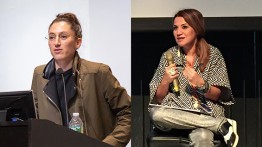2019 School of Architecture Full-Time Faculty Appointments
POSTED ON: August 15, 2019

Nora Akawi and Lydia Kallipoliti
Nora Akawi and Lydia Kallipoliti have joined the faculty of The Irwin S. Chanin School of Architecture as the newest Assistant Professors. Nader Tehrani, dean of the school, released the following letter to the community:
It gives me great pleasure to announce that, following an open search that received over two hundred applications, Nora Akawi and Lydia Kallipoliti will join the School of Architecture community as full time, tenure track faculty beginning September 1.
Over the extended period that the search committee met, and as our school’s curriculum continues to evolve through the faculty’s consideration of some of the larger cultural questions with which we are faced today, there are two thematic areas of discussion that have come into focus. The first addresses the evident urgencies of climate change, and some of the disciplinary effects it is having on the built environment, while the second addresses some of the political, social and cultural consequences of these impacts. To this end, Kallipoliti’s background in both architecture and engineering brings a theoretical and historical perspective to questions of the environment that stands to change the nature of inter-disciplinary research that can be undertaken in the school of architecture. In turn, Akawi’s work on urbanism, geography and the political underpinnings of representation exemplifies some of the cross-cultural implications of revisiting histories of the city, mapping, and the territory as a cultural construct. With a deep investment in design sensibilities, both stand to expand our conversation at The Cooper Union, while effectively speaking to some of the deep-seated investments already in place within our institution.
Nora Akawi is an architect based in New York. Through research, curatorial and pedagogical practices, her work is focused on the expansion of the geographies and languages within contemporary repertoires of architecture history, theory, and representation. More specifically, her work lies at the intersection of urban and environmental justice, collective memory, and architecture—drawing from migration and border studies, mapping practices and archive theory.
Prior to joining The Cooper Union, Nora taught graduate urban design studios and history/theory courses at the Graduate School of Architecture, Planning and Preservation (GSAPP) at Columbia University. Since 2012, she served as director of Studio-X Amman, with the Columbia Global Centers | Amman and Columbia GSAPP, where she led public programming, educational, exhibition and publishing projects focused on architecture in the Arab world. Recent selected publications include “Drawing From the Jawlan” in GTA Papers 2: War Zones (ETH Zürich, 2019), and “Worlding From the South” in Manifesta 12: Palermo Atlas, (OMA / Manifesta / Humboldt Books, 2018). Nora is co-curator of Friday Sermon, the Bahrain Pavilion exhibition in the Biennale Architettura 2018 in Venice, and curator of Al Majhoola Min Al-Ard at the Biennale d’Architecture d’Orléans (opening in October 2019). She is co-editor of the books Friday Sermon (Bahrain Authority for Culture and Antiquities, 2018) and Architecture and Representation: The Arab City (Columbia Books on Architecture and the City, 2016).
Lydia Kallipoliti is an architect, engineer and scholar whose research focuses on the intersections of architecture, technology and environmental politics. She was previously an Assistant Professor at Rensselaer Polytechnic Institute, where she directed the MSArch program, and at Syracuse University; she has also taught at Columbia University, Pratt Institute and The Cooper Union.
Kallipoliti is the author of the book The Architecture of Closed Worlds, Or, What is the Power of Shit (Lars Muller, 2018), as well as the History of Ecological Design for Oxford English Encyclopedia of Environmental Science. Her work has been exhibited in a number of international venues including the Venice Biennial, the Istanbul Design Biennial, the Shenzhen Biennial, the Oslo Trienalle, the London Design Museum and the Storefront for Art and Architecture. Kallipoliti is the recipient of a Webby Award, grants from the Graham Foundation, and the New York State Council for the Arts, an Honorable Mention at the Shenzhen Biennial, a Fulbright scholarship, and the ACSA annual award for Creative Achievement. Recently, she was recognized as a Leading Innovator in Sustainable Design in BUILD’s 2019 Design & Build Awards, while her book was a finalist among all publications in design, art and architecture in 2018 for the Cornish Family Prize by the National Gallery of Victoria in Melbourne. She holds a Diploma in Architecture and Engineering from AUTh in Greece, a SMArchS from MIT and a PhD from Princeton University.
On behalf of the entire School of Architecture, I thank the Faculty Search Committee for their diligence, dedication and many hours of discussion and debate during the search process. We are especially grateful to Diana Agrest and Anthony Vidler for their work as co-chairs of the committee.
We look forward to welcoming Professors Akawi and Kallipoliti to the School in the fall and to the new areas of thought that they will bring to the school.




